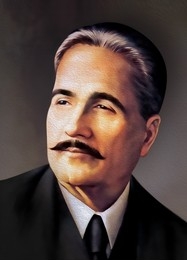Allama Muhammad Iqbal, widely revered as “Spiritual Father of Pakistan”, was an enormously influential Muslim philosopher, poet, barrister and political thinker. Through his poetry and writings, Iqbal provided spiritual inspiration for the Pakistan movement and propagated the idea of a separate Muslim state in the Indian subcontinent.

Iqbal synthesized classical Islamic teachings with modernist sensibilities to lay the foundations of independent Muslim thought in South Asia. His vision of an empowered Islamic civilization serves as a philosophical guide for Pakistan even today.
Early Life and Education
Allama Iqbal was born on November 9, 1877 in Sialkot, Punjab Province, British India. His family was Kashmiri Pandit Hindus who had converted to Islam.
Iqbal’s father Shaikh Noor Mohammad was a tailor and Sufi mystic whose influence on his son’s philosophical development was immense. Iqbal’s mother Imam Bibi instilled in him a love for poetry and literature from a young age.
As a student, young Muhammad Iqbal was academically brilliant and earned scholarships throughout his education. He obtained Bachelor of Arts degree from Government College Lahore in 1897.
Iqbal later traveled to Europe where he completed Masters degree from Cambridge University, a law degree from Lincoln’s Inn in London and PhD from Ludwig Maximilian University of Munich in Germany.
This Western education greatly expanded Iqbal’s knowledge of history, philosophy, literature and modern sciences. The experience shaped his ideas on reforming Islamic civilization.
Table 1: Allama Iqbal’s Education
| Primary Education | Scotch Mission School, Sialkot |
|---|---|
| Undergraduate | BA, Government College Lahore (1897) |
| Higher Education |
MA, Cambridge University (1905) Bar-at-Law, Lincoln’s Inn London (1907) PhD, Ludwig Maximilian University Munich (1908) |
Early Career and Travels
During his years studying in Europe from 1905 to 1908, Iqbal also traveled extensively visiting Spain, Switzerland, France, Italy and Afghanistan.
On returning to British India in 1908, he embarked on a successful career in law, academia and literature. He practiced law in Lahore while teaching philosophy and writing poetry in Urdu and Persian languages.
Iqbal’s poetry collections including Rumuz-e-Bekhudi, Payam-e-Mashriq and Bang-e-Dara, which denounced oppression and energized Muslim youth, brought him fame across India and beyond.
For his literary contributions, Iqbal was knighted by the British government and elected Fellow of the Royal Society of Arts. He remains one of only a handful of people honored with both a knighthood and this prestigious fellowship.
In the 1920s, Iqbal participated in Indian politics serving as president of All India Muslim League. But he became disillusioned with mainstream politics preferring to engage through spiritual and intellectual channels.
Table 2: Key Events of Iqbal’s Early Career
| Practiced as barrister-at-law in Lahore | 1908 – 1933 |
|---|---|
| Taught Arabic and Philosophy, Government College Lahore | 1911 – 1932 |
| Knighted by the British government | 1923 |
| Elected Fellow of the Royal Society of Arts | 1923 |
| President of All-India Muslim League | 1930 – 1931 |
Philosophical Thought and Works
As a philosopher seeking reform of the Muslim ummah, Iqbal’s seminal work was “The Reconstruction of Religious Thought in Islam” published in 1934. It laid foundations for a modernist Islamic philosophy adapted to the 20th century.
Central to Iqbal’s philosophy was the concept of khudi or cultivation of the self/ego to empower both individuals and the wider community. He rejected notions of mysticism based on destroying the ego and self-annihilation.
Iqbal advocated a return to ijtihad (independent reasoning) and emphasized the need for Muslims to rationally reinterpret Quranic principles in modern contexts. He critiqued the West’s materialism and called on Muslims to preserve spiritual aspects.
Among Iqbal’s other important works are “The Development of Metaphysics in Persia”, “The Secrets of the Self”, “Message from the East”, “Bal-e-Jibril” (Urdu verse). His hundreds of letters also contain key philosophical ideas.
The great poet-philosopher died on April 21, 1938 but his dynamic vision and inspiring poetry continue to motivate generations of Muslims around the world.
Table 3: Major Philosophical Works of Allama Iqbal
| Title | Year Published | Language |
|---|---|---|
| The Development of Metaphysics in Persia | 1908 | English |
| The Reconstruction of Religious Thought in Islam | 1930 | English |
| The Secrets of the Self | 1915 | Persian |
| Message from the East | 1923 | English |
| Bal-e-Jibril | 1935 | Urdu |
Contribution to Pakistan Movement
Iqbal was the first prominent public figure to envision the creation of an independent Muslim state in northwest India in his presidential address at Allahabad in 1930.
He proposed that Indian Muslim provinces should be autonomous states under the British rule. This idea of “State within a State” would preserve Muslim identity and rights in a future united India.
Iqbal had realized that Muslims needed a separate homeland to freely practice their faith and culture away from the threat of being overwhelmed as a minority.
While the Pakistan idea crystallized in his mind long before, it was in private correspondence with Muhammad Ali Jinnah from 1936 onwards that Iqbal urged him to lead the struggle for establishing a new Muslim majority state.
Iqbal sent his blessings for success to Jinnah shortly before his death in 1938. Under Jinnah’s leadership, the Pakistan movement gained tremendous momentum in the coming decade culminating in the creation of Pakistan in 1947.
Table 4: Iqbal’s Role in the Pakistan Movement
| Year | Key Contributions |
|---|---|
| 1930 | Proposed idea of separate Muslim state in Allahabad address |
| 1933 | Wrote to Jinnah urging him to return to India |
| 1936 – 1937 | Correspondence with Jinnah explaining need for new Muslim homeland |
| 1938 | Sent message of support to Jinnah shortly before his death |
National Poet of Pakistan
As a poet and philosopher with immense love for his faith and community, Iqbal holds a central position in Pakistan’s national identity and culture.
He composed various nationalist poems including the hugely influential “Saare Jahan Se Accha Hindustan Hamara” which was later adopted by the government of India as an unofficial national song.
However, Iqbal’s greatest poetry collection “Bang-e-Dara” (Call of the Marching Bell) composed in Urdu is regarded by Pakistanis as their true national poetic work.
The government officially declared Iqbal the “National Poet of Pakistan” in 1974. His birthday on 9th November is celebrated annually as “Iqbal Day” with national ceremonies and tributes.
Many verses from his poetry including the inspirational “Lab Pe Aati Hai Dua” have been incorporated into Pakistan’s national anthem. Schools and universities throughout the country bear Allama Iqbal’s name in his honor.
Table 5: Significance of Iqbal’s Poetry for Pakistan
| Poetry Collection | Significance |
|---|---|
| Saare Jahan Se Accha | Unofficial anthem but adopted by India |
| Bang-e-Dara | Considered national epic for Pakistan |
| Verses adopted into national anthem | “Lab Pe Aati Hai Dua” among others |
| National Poet | Declared in 1974 by the Government |
| Iqbal Day | His birthday celebrated annually on 9 November |
Death and Legacy
By the mid-1930s, Iqbal’s health was declining but he continued writing prolifically despite his illness. He passed away on April 21, 1938 at the age of 60 in Lahore.
Over a million admirers attended Iqbal’s funeral at Lahore’s historic Badshahi Mosque. To honor him, the government awarded Iqbal a state funeral. He rests in a mausoleum located near the mosque.
Through his revolutionary poetry and philosophical vision, Allama Iqbal awakened the political consciousness of Muslims of British India and inspired the struggle for Pakistan.
Just as he had dreamed, Iqbal’s beloved Punjab became the heartland of the world’s first Islamic republic as an independent homeland for South Asian Muslims.
A stimulating thinker and advocate for empowerment, Iqbal lives on as the Spiritual Father of Pakistan and one of the Muslim world’s greatest modern philosophers.
Conclusion
Few individuals have shaped the identity of a nation the way Allama Muhammad Iqbal molded the idea of Pakistan through his writings. His call urging South Asian Muslims to march towards spiritual enlightenment and self-development laid the seeds for a new Islamic republic.
As the immense respect and affection Pakistanis have for Iqbal shows, he was more than just a philosopher. Iqbal gave voice to the hearts of Muslims yearning for freedom and inspired them to finally achieve it under Jinnah’s leadership. His immortal poetry and thoughts will continue to uplift and guide Pakistan towards the progressive vision he had conceived.


